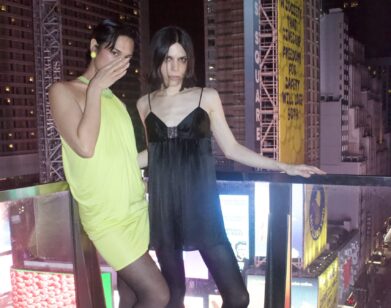For YACHT, Heaven is a Place on Earth

Yâ??CHT: Claire L. Evans (left) and Jona Bechtolt
There is more than one way to appreciate the band-art project-community that is Yâ??CHT. You can immerse yourself in the symbolism—the ubiquitous triangles, lately featuring smiley faces; the anchors; the tattoo policy that’s laid out on the Team Yâ??CHT website. You can hit the books and explore what inspired Claire L. Evans and Jona Bechtolt to make the eternal search for utopia the inspiration for their second album as a duo, Shangri-La. That current reading list includes Sir Thomas More’s seminal work, as well as the writings of anarchist Hakim Bey, whose conception of the “Temporary Autonomous Zone” is central to the new record.
Or, you can forget all that, and party with one of the more festive dance-pop outfits around. Yâ??CHT in its current live incarnation, with Evans and Bechtolt joined by backing band The Straight Gaze (“Bobby Birdman” Kieswetter, Jeff Brodsky, and Katy Davidson) is a traveling party, and armed with new jams like their “post-apocalyptic fight song” “Dystopia (The Earth Is on Fire),” it is not to be missed. Interview caught Yâ??CHT’s disco inferno recently at the Music Hall of Williamsburg, and the next day, sat down at nearby Sweetwater with Evans and Bechtolt.
JOHN NORRIS: I’ve seen Yâ??CHT before, but never a show like the one I saw last night. You have been playing with this new band for more than a year now. Does it feel to you like there is a new energy to Yâ??CHT these days?
JONA BECHTOLT: Oh, definitely.
NORRIS: Not that it wasn’t fun before, but you guys just seem newly liberated.
CLAIRE L. EVANS: It’s a little less weight to carry. You know, when you’re two people in front of a video projection screen with backing tracks, there’s a lot of responsibility. The onus is really on you; it’s very present. And it is still very in the moment, but it feels like there’s an entourage. There’s more of a community, it’s very physical, it’s like we can share our successes and failures with a group of people that we love, which is always nice.
BECHTOLT: And we want to increase physicality as much as we can. Yâ??CHT started with just me: we doubled in size with Claire, and then doubled with Bobby Birdman and Jeff, and now we’ve added Katy Davidson. So it’s great.
NORRIS: And the set list seems to include a lot of the new album.
EVANS: It’s mostly the new album—I would say 80 percent. Which is exciting for us, because we’d been playing the songs from See Mystery Lights, the last record, for almost three years now. And these are the things that are closest to our heart right now. I mean, Shangri-La, our new record, is something that we spent a long time working on recently. And it’s very personal, and we’re in love with it.
BECHTOLT: Plus it’s great to road-test the songs and see which ones work with people, so that’s why we’re playing most of them.
NORRIS: And can you tell which ones get the best reaction at this point? I guess they know “Dystopia” and “Utopia” already?
BECHTOLT: Yes, but among the ones they don’t know, it’s interesting to see which ones they like and which places like some songs more than other places, and which age groups. We do a lot of impromptu market research!
EVANS: Really study the demographic, ages, genders.
BECHTOLT: That laptop we have onstage is not playing music. It’s actually a spreadsheet into which I am entering data.
EVANS: Live updating of stats. It’s the future of music, by the way.
NORRIS: Last night when you asked the crowd, “Do you guys know Judas Priest?” I was thinking, “Where is this going? Is Jona going to break into ‘Hell Bent for Leather’ or something?”
BECHTOLT: Yes, actually.
NORRIS: But in fact, it was a cover of “Breaking the Law”, which I thought seems to tie into what I saw an anarchy theme to parts of Shangri-La.
EVANS: Well, the thing about a cover is that you have an opportunity to show people what your context is? I think people will always read you the way they want to understand you. And once you release an album into the world, it’s not really yours anymore. Everybody owns it as much as you do, just by virtue of having a little tiny piece of it. People have different ideas about who we are, what we’re like, where we’re coming from, and we like to present a little bit of our background through a cover like that. We used to do a cover of an X song, and other cover like that. But the “Breaking the Law” cover comes from Jona’s past.
BECHTOLT: Yeah, my older brother—he’s eight years older than me—Joel, he was my sole inspiration for music as a young person. He turned me on to punk and to rap and metal. And he was in a high-school band and they covered “Breaking the Law,” so that was my first exposure to that song. I was so into it.
NORRIS: I believe you have said this is probably the most “thematic” Yâ??CHT record to date. How did that come to be, and this thread of utopia and perfection or Shangri-la, how and when did it come about?
BECHTOLT: I don’t know if it’s the most thematic work for us. But we definitely like to create a framework in which we work.
EVANS: Yeah, we work well within limitations, and we made a point of beginning with an idea. We wanted to make an album about utopia because it seemed like the logical next step for us. The last record was very much about this paranormal experience we shared when we were living in Marfa, Texas and because of that experience we began to research and think a lot about religion and spirituality and mysticism and magic and the sort of esoteric history of the world, and developing a sort of personal philosophy based on those ideas. And then as we traveled around the world, playing that music, talking to people, thinking about it, marinating with it, eventually we had to evolve past just a voyeuristic interest in those things and think about how we could actually apply those principles to our life if that is what we were gonna actually believe in.
BECHTOLT: Walking the walk and talking the talk.
EVANS: It seems to us that a utopia is essentially ideas made physical, right? It’s like if you believe in something so strongly that is a physical place where people have to live by those ideals, that’s what a utopia is. It’s a singular person or community’s implementation of their philosophy in an actual place. And there’s something about the practicality and the physicality of that that really appeals to us. As Jona said earlier, we’re really trying to move more and more towards physicality. Growing in numbers, growing in presence, community. So that was our starting point. It wasn’t like, “We’re going to only make songs about utopia,” it’s just that was our starting point. We read a lot of materials, all the classic utopian literature, Thomas More’s Utopia, H.G. Wells, Francis Bacon, and we read a lot of science fiction, and read a lot about failed utopias, because there’s not one without the other.
BECHTOLT: Jonestown…
EVANS: Jonestown and things like that.
NORRIS: Dystopias, which of course you address on one of the songs on the record.
EVANS: That song we tried to make a narrative song. We tried to imagine a story that that song was based on, which I can’t remember the specifics of now. We wrote it around the time of the Deepwater Horizon oil spill, and there was this incredibly bleak, fatalistic, apocalyptic attitude among our peers and in the media about what was happening environmentally and who was taking care of that. I had just finished reading this Octavia Butler book called Parable of the Sower, which is about post-apocalyptic Los Angeles where everybody lives in gated communities with like military guards and stuff. So we were thinking about a broken-down world, an overheated world. So we were trying to make a story out of all those ideas and obviously we’re very interested in duality, we’re a duo, we think about two sides of a story, because we’re very different actually, creatively. Black and white, life and death. All that is very interesting to us. So if we were gonna make an album about utopias, we didn’t want it to be this myopic, super-optimistic gung-ho album about “finding your own way.” We wanted it to be authentic to the complete idea.
NORRIS: And you have just released this amazing dual video for “Utopia” and “Dystopia.”
EVANS: They were directed by this amazing man Rene Daalder, who’s a hero of mine. He’s a radical Dutch filmmaker living in Los Angeles, he made an incredible punk-rock musical in the Seventies called Population: 1. It stars Tomata du Plenty from The Screamers as the last living man on Earth, living in a bunker, telling the entire history of western civilization through song and dance. It’s like, insane.
BECHTOLT: It’s for people who think that The Rocky Horror Picture Show is a little too straight.
EVANS: And then he made a bunch of B science fiction movies in the ’80s and ’90s, and he was sort of a pioneer of CG and video animation and worked on like Robocop and What Dreams May Come and these weird Hollywood movies. But he’s an incredible person, he’s a total polymath, he’s a great writer, he is a complete iconoclast in his own way, and I’ve been a super huge fan of his for a long time and so we approached him. He’s essentially the first person we’ve ever allowed any creative control to. We usually don’t revoke that [rule] too often, but he’s a special individual and we’re proud and excited to have worked with him.
SHANGRI-LA IS OUT NOW. FOR MORE ON THE BAND, VISIT THEIR WEBSITE. TO WATCH THE FULL VIDEO OF THIS INTERVIEW, VISIT NOISEVOX.






